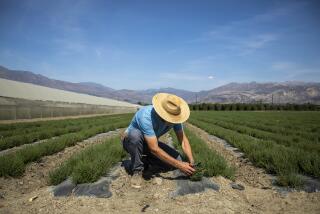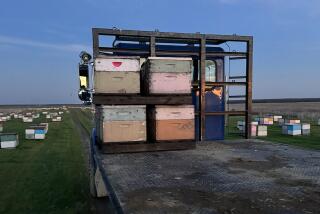Farming’s sweet lessons
The spark came from a cranky email. Your peaches are lousy, an unhappy eater in Brooklyn wrote, and you should be ashamed of yourself!
David Mas Masumoto, whose peaches are nationally renowned for their flavor and served in the finest restaurants on both coasts, might have shrugged and hit “Delete” without a second thought. Instead, he printed out the note and fumed. He was offended by the notion of shame, because while he takes great pride in his peaches, he takes even greater pride in his work.
The answer, decided the No. 1 peach proselytizer, was to proselytize even harder. He wanted to expose people to his farm and let them experience his world with all their senses — to kneel in the dirty, dusty loam, sniff the brown rot, maneuver the tripod ladders, mourn the broken branches, wrestle with the decision of when to harvest, and pursue the elusive quest for the perfect peach.
Thus was born the Masumoto Peach Tree Adoption Program, another notch in the rock-star farmer’s ongoing crusade to connect people with the food they eat. For the seventh year, Masumoto paired teams of peach parents with specific trees on his 80-acre organic farm in the tiny community of Del Rey, just southeast of Fresno. Each adopted tree sports a placard with its team name: The Fuzzy Wuzzies, Fuzzy Logic, Peach Now, No Peach Left Behind. In midsummer, Masumoto welcomes adopters who journey to the Central Valley from all over the state and beyond to harvest their fruit.
“Do you feel like a veteran?” Korio Masumoto, Mas’ son, asked before I headed for our tree in late July. In truth, I did, though this was only my second summer. I knew to look at the color of a peach at the stem, not just on the side, before judging whether to harvest. I knew peaches picked too soon would still ripen, but those left an extra week might grow into gorgeous softball-sized fruit. I knew the best way to sort and pack the peaches. I knew how a real, ripe Elberta peach looked and smelled and tasted.
In his efforts to educate people about peaches grown for taste rather than durability and color, Mas Masumoto has built a sort of community, forging the kind of connections he argues should lie at the heart of farming. For two consecutive Saturdays, his orchard fills with people who have arranged their summers around the needs of their peaches, who made no plans for the four possible harvest weekends, in order to be available to travel to Fresno when the fruit is ready and spend hours in the 90-degree heat picking and packing peaches. Then they rush home, quickly extract peaches from the packing boxes, sort by degree of ripeness, and again life centers on peaches: peaches to bake, peaches to freeze, peaches to dry, peaches to give away and, best of all, peaches just to eat, several times a day.
A handful of the 43 teams have returned all seven years, and only nine this year were, in Masumoto speak, adoption virgins. All had submitted applications and written essays (“If your tree could talk, what story would it tell about your team?”) that were carefully reviewed by the four Masumotos: Mas; his wife and partner, Marcy; daughter Nikiko, a performance artist and apprentice farmer; and Korio, a college student. Each team of up to six harvesters per day paid $600 to adopt a tree that produces 350 to 450 pounds of fruit, which nets Masumoto about what he would make selling the peaches through normal channels.
What drew me to make the commitment went deeper than the amazing flavor of peaches scorned by the commercial market because they bruise too easily and turn golden yellow rather than red. The force that binds this once-a-year instant community is the warm exuberance of the Masumotos, the opportunity to learn from someone who truly loves his work, takes joy in talking about dust and imperfect fruit, and delights in gently squeezing a ripe peach to show how the juice squirts out.
Masumoto frames his everyday struggles and dilemmas in ways that enhance my understanding of food and farming, but I leave pondering the more universal implications of his lessons about loss, luck, creativity and responsibility. Deadlines in the orchard are set by nature, not man, and the successful farmer adapts rather than fights. Speed is occasionally necessary, but often not a virtue. Imperfection is a given. So are limits.
Simple images, like the passage Masumoto read to the teams on Saturday morning from an essay he wrote about sweat, provoke complicated thoughts that linger long after the last peach disappears: “Sweat reminds me of limits. Sweat defines the character of our farm. I think of sweat as clean and honest. Summer work in 100-degree heat, fool to be outhere!But peaches demand it.”
This summer Masumoto narrowly escaped a calamitous, unforeseen object lesson for the peach parents. Adopters reserve four weekends in late July and early August, and Masumoto chooses the harvest dates about a month in advance. He vacillated between starting on July 28 and Aug. 4, finally going with the earlier date. Over the next few weeks, for no apparent reason, the Elberta peaches ripened dramatically and unexpectedly fast. One more week and much of the fruit would have been rotten. He had dodged a bullet, but he was shaken.
The family discussed how they would have coped because, sooner or later, they’re bound to guess wrong. When that happens, Masumoto figures, he will just have to explain the sudden changes and invite any parents who can shift plans at the last minute to show up a week earlier. They may not be pleased, but if they have learned anything from the adoption experience, they will surely understand.
Miriam Pawel is the author of “The Union of their Dreams: Power, Hope and Struggle in Cesar Chavez’s Farm Worker Movement,” and a founding member of May the Peach Be With You.
More to Read
A cure for the common opinion
Get thought-provoking perspectives with our weekly newsletter.
You may occasionally receive promotional content from the Los Angeles Times.






